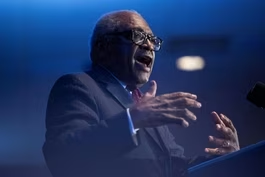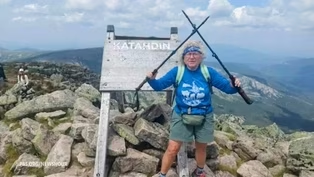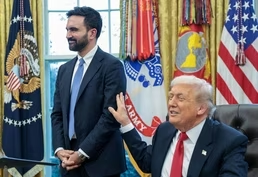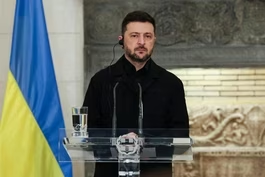
Capehart and Continetti on Trump's warm welcome of Mamdani
Clip: 11/21/2025 | 12m 4sVideo has Closed Captions
Capehart and Continetti on Trump's warm welcome of Mamdani
Jonathan Capehart of MS NOW and Matthew Continetti of the American Enterprise Institute join Amna Nawaz to discuss the week in politics, including President Trump playing nice with Zohran Mamdani in the Oval Office but calling six other Democrats traitors and saying the video they posted could be punishable by death and the president hosting the Saudi crown prince at the White House.
Problems playing video? | Closed Captioning Feedback
Problems playing video? | Closed Captioning Feedback
Major corporate funding for the PBS News Hour is provided by BDO, BNSF, Consumer Cellular, American Cruise Lines, and Raymond James. Funding for the PBS NewsHour Weekend is provided by...

Capehart and Continetti on Trump's warm welcome of Mamdani
Clip: 11/21/2025 | 12m 4sVideo has Closed Captions
Jonathan Capehart of MS NOW and Matthew Continetti of the American Enterprise Institute join Amna Nawaz to discuss the week in politics, including President Trump playing nice with Zohran Mamdani in the Oval Office but calling six other Democrats traitors and saying the video they posted could be punishable by death and the president hosting the Saudi crown prince at the White House.
Problems playing video? | Closed Captioning Feedback
How to Watch PBS News Hour
PBS News Hour is available to stream on pbs.org and the free PBS App, available on iPhone, Apple TV, Android TV, Android smartphones, Amazon Fire TV, Amazon Fire Tablet, Roku, Samsung Smart TV, and Vizio.
Providing Support for PBS.org
Learn Moreabout PBS online sponsorshipAMNA NAWAZ: Well, as President Trump plays nice with one Democrat in the Oval Office, he's called six others traitors and said the social media video that they posted could be punishable by death.
For analysis of the week, we turn now to Capehart and Continetti.
That is Jonathan Capehart of MS NOW and Matthew Continetti, Wall Street Journal opinion columnist and scholar at the American Enterprise Institute.
David Brooks is away this evening.
Welcome to you.
Thanks for being here.
MATTHEW CONTINETTI, American Enterprise Institute: Thanks for having us.
AMNA NAWAZ: Jonathan, let's jump into that meeting in the Oval Office, because President Trump went from calling Zohran Mamdani a communist, threatening to strip his citizenship, to complimenting him, stepping in to defend him in the Oval Office, as Liz reported earlier.
What happened?
JONATHAN CAPEHART: Threatening also to send the National Guard in if he were to win the election.
It was the most extraordinary moment -- for me, the most extraordinary moment of the Trump presidency.
I was wondering if a mayor like Mamdani would be the Volodymyr Zelenskyy of the day.
And instead what we saw was an incredible lovefest.
And by lovefest, I mean the president of the United States just heaping all sorts of compliments and dare I say love on Mamdani.
And I think there's three things happening here.
Game respects game.
And so I think the president looked at how Mamdani ran his campaign, how many votes he got in the election, a million votes versus President Trump got 700-something-thousand votes when he ran in a presidential election in New York City.
You could tell that the president respects Mamdani as a result of that.
And the third thing, the president at various moments in that meeting totally undercut Republican arguments against Mamdani, including Congresswoman Elise Stefanik, who's going to run for governor of New York, who had been calling the mayor-elect a jihadist for months.
And when asked, the president said no.
(LAUGHTER) JONATHAN CAPEHART: It's extraordinary.
AMNA NAWAZ: Matt, what surprised you about -- what stood out to you?
And, also, is it harder now for Republicans to go after Mamdani in the same way?
MATTHEW CONTINETTI: I think if you had cut to ads tonight, yes, it would be hard.
But this relationship is only just beginning.
I think over the course of the Trump era, we have discovered there's a difference between meeting Trump and rally Trump or social media Trump.
And in meeting Trump, if you're not Volodymyr Zelenskyy, typically, meetings go very well with Donald Trump, especially -- and he wants to convey that he is a good host, he's welcoming.
And so he wanted to convey that same atmosphere meeting Mamdani, much to the surprise of the Republicans.
The other thing here is, they're both outsiders.
They're both populists.
In the Democratic world, in the Democratic socialist world, populism is expressed through Israel-Palestine and through economic issues.
In national populism, Republican populism, it's expressed on the border, cultural types.
But there is still this kind of fundament that connects them.
And I think that's why Trump was a little bit nicer than a lot of us expected.
AMNA NAWAZ: What about the affordability issue?
I mean, our latest polling shows there is no more single important issue for Americans today.
When asked about what should be the president's top priority, lowering prices, 57 percent said that should be -- the next closest issue was immigration at 16 percent.
Jonathan, this is an issue that Mayor-Elect Mamdani has been laser-focused on.
Was that informing some of this meeting too?
JONATHAN CAPEHART: Oh, absolutely.
Absolutely.
I mean, the president's been talking about -- quote, unquote -- "the affordability issue," this new issue that's out there.
No, that is why Democrats won elections up and down the ballot around the country, particularly governor of New Jersey, Virginia, and obviously Mayor-Elect Mamdani in New York City.
And so, again, for the president to tie himself to Mr.
Affordability, Zohran Mamdani, I think the mayor-elect got more out of this.
I'm sorry.
The president got a whole lot more out of this meeting, I think from his point of view, than the mayor-elect did.
MATTHEW CONTINETTI: I mean, affordability elected Mamdani, but it also elected Donald Trump last year.
Inflation was one of the number one issues that got Donald Trump the popular vote for the first time in 20 years for a Republican.
The issue is, how are you going to get to affordability?
And I think that's where the two politicians diverge.
Mamdani wants to have more government-controlled solutions, more price controls.
Donald Trump, with that big asterisk of tariffs, is usually about deregulation, tax cuts, more supply.
We're going to have an experiment, which means reach that affordability,and quicker.
AMNA NAWAZ: I also want to ask you about this week a remarkable video we saw from six Democratic lawmakers, all of whom have national security and defense backgrounds, urging military members to disobey unlawful orders.
Take a listen.
REP.
CHRIS DELUZIO (D-PA): Right now, the threats to our Constitution aren't just coming from abroad... REP.
JASON CROW (D-CO): ... but from right here at home.
SEN.
MARK KELLY (D-AZ): Our laws are clear.
You can refuse illegal orders.
SEN.
ELISSA SLOTKIN (D-MI): You can refuse illegal orders.
REP.
CHRIS DELUZIO: You must refuse illegal orders.
SEN.
ELISSA SLOTKIN: No one has to carry out orders that violate the law... REP.
CHRISSY HOULAHAN (D-PA): ... or our Constitution.
AMNA NAWAZ: Now, President Trump called for them to be arrested.
He called it seditious behavior from traitors punishable by death.
White House Press Secretary Karoline Leavitt was asked if the president was calling for the execution of members of Congress.
Here's what she had to say.
KAROLINE LEAVITT, White House Press Secretary: No.
Let's be clear about what the president is responding to.
You have sitting members of the United States Congress who conspired together to orchestrate a video message to members of the United States military, to active-duty service members, to members of the national security apparatus, encouraging them to defy the president's lawful orders.
AMNA NAWAZ: Jonathan, I asked Congressman Crow about this yesterday, who was featured in that video, what specifically they're asking military members to do.
He said it's not about a specific order.
Is it clear to you why they put this video out?
JONATHAN CAPEHART: Yes, because they're concerned about what the president could do, what the president might ask the military to do.
And it's not a stretch when you see judges have issued rulings telling the president and administration to do things or not do things, and the administration openly defying the courts.
So it's not unreasonable for members of Congress who have served in the military to have concern about how that might reach its way into the Pentagon.
And I'm glad you played that clip from the White House press secretary, because right there in her answer you see the disingenuousness.
The members of that video, they said unlawful orders.
And what the press secretary said, they're asking them to defy lawful orders.
That is not what the members of Congress were asking service members to do.
And one other thing.
I was talking to Senator Ruben Gallego yesterday.
And he made the point, what those members of Congress were doing was nothing more than what's in the training that service members get.
They are just reiterating what they get in training.
There's nothing extraordinary about what they said.
AMNA NAWAZ: I want to ask for your response to the video, but also to put to you that Senator Slotkin, who's in that video, said she and other members of the video have gotten close to 1,000 threats since it was posted.
Congressman Crow posted some of the threats he's been receiving calling for his family to be killed.
It's chilling stuff.
But how dangerous is the president's rhetoric on this?
MATTHEW CONTINETTI: I think a lot of the rhetoric has been very dangerous.
I think both sides here have been not covering themselves in glory.
On the one hand you're calling the president a fascist, a dictator in training, someone who's going to issue unlawful orders, even though they can't name a single unlawful order that the president has given.
And then, of course, you have the president himself calling this sedition, treason, punishable by death.
If we want to lower the temperature, it will take responsibility on every party.
But what has struck me about this is how it's a partisan split screen.
Both parties are playing to their bases here.
The Democrats are rallying behind these congressmen, and the Republicans almost uniformly are rallying behind President Trump.
So, I don't think that this is going to have a long-term effect politically on the president.
AMNA NAWAZ: Jonathan, you want to respond?
JONATHAN CAPEHART: I sort of bristle at the idea that this is a both sides thing.
What we have here in terms of the threats, particularly against these members of Congress, it's that you have the president of the United States retweeting or whatever you want to call it threats against members of Congress.
He is the one who in language and in -- if you want to go back to January 6, in deeds who is fanning, fomenting the nastiness that is out there.
If we want to lower the temperature, if we want to change the way we do politics in the country, it has to start with the chief executive.
It has to start with the president.
And he has shown an unwillingness to do that.
MATTHEW CONTINETTI: And it also has to be followed through by all of us, including people who are betraying him - - portraying him as an authoritarian who poses an existential threat to this country.
JONATHAN CAPEHART: There's lots of evidence that it's not unwarranted.
AMNA NAWAZ: Let's talk about another moment this week that brought about some of the challenges we have seen in terms of how the president interacts with members of the press specifically.
We saw him host the crown prince of Saudi Arabia, Mohammed bin Salman, at the White House.
He was asked about the 2018 killing of The Washington Post journalist Jamal Khashoggi and here's what he had to say.
DONALD TRUMP, President of the United States: You're mentioning somebody that was extremely controversial.
A lot of people didn't like that gentleman that you're talking about.
Whether you like him or didn't like him, things happen.
AMNA NAWAZ: Jonathan, as you know, it was ABC's Mary Bruce who asked about Khashoggi.
She later asked about Jeffrey Epstein.
The president lashed out at her, called her a terrible person, a terrible reporter, threatened to revoke ABC's license.
That followed him calling another women reporter, Catherine Lucey of Bloomberg, "Piggy" on Air Force One.
What does all of this say to you right now about the president's relationship with journalists and how he views the press?
JONATHAN CAPEHART: Well, he views the press with the lowest of regard.
He certainly has a problem with women journalists who ask him tough questions, who do their jobs of trying to hold the president of the United States account -- to account.
And he takes it personally.
The idea that the president of the United States would talk about my former colleague at The Washington Post as he's a controversial guy, basically insinuating that he deserved being murdered and chopped up with a bone saw in Turkey, the president of the United States used to be the person who stood for free press, for democracy, for the role of the press in upholding a democracy.
And yet there he has no problem undermining that across from someone like -- like MBS and certainly by berating a terrific -- the terrific journalist from ABC who asked very straightforward and pointed questions.
AMNA NAWAZ: Matt, I'm going to give you the last word here in the minute or so we have left.
What do you take away from this?
MATTHEW CONTINETTI: My big takeaway is, we have heard Donald Trump speak this way to reporters and to women reporters since the first Republican debate in August 2015 in Megyn Kelly, who was then challenging Trump as the FOX anchor.
That's not new.
What is new is Donald Trump's political situation.
And I think he understands that the economy, affordability, these bread-and-butter issues we have been talking about, do pose a real risk to the Republican majority next year.
And I think that's why you're seeing a more elevated, angry Trump in some of these interactions with the press.
AMNA NAWAZ: You think he's lashing out more because he's feeling more pressure?
Is that right?
MATTHEW CONTINETTI: I think that's - - I can only say what has changed.
What has changed is that Donald Trump's political situation has deteriorated since these off-year elections earlier this month.
AMNA NAWAZ: Matthew Continetti, Jonathan Capehart, great to have you both at the table.
Thank you so much.
MATTHEW CONTINETTI: Thank you.
JONATHAN CAPEHART: Thanks, Amna.
Clyburn spotlights trailblazing Black congressmen in book
Video has Closed Captions
Clip: 11/21/2025 | 7m 6s | Clyburn spotlights trailblazing Black members of Congress in 'The First Eight' (7m 6s)
How Colorado is working to protect vaccine access
Video has Closed Captions
Clip: 11/21/2025 | 8m 52s | Colorado aims to protect vaccine access as Trump administration casts doubt on safety (8m 52s)
Oldest woman to hike Appalachian Trail reflects on journey
Video has Closed Captions
Clip: 11/21/2025 | 3m 3s | Oldest woman to hike the entire Appalachian Trail reflects on her journey (3m 3s)
Trump and Mamdani meet after months of trading insults
Video has Closed Captions
Clip: 11/21/2025 | 5m 23s | Trump and Mamdani meet in Oval Office after months of trading insults (5m 23s)
Zelenskyy pressured to accept Trump's Ukraine peace plan
Video has Closed Captions
Clip: 11/21/2025 | 9m 16s | Zelenskyy faces pressure from Trump to accept his Ukraine peace plan (9m 16s)
Providing Support for PBS.org
Learn Moreabout PBS online sponsorship
- News and Public Affairs

FRONTLINE is investigative journalism that questions, explains and changes our world.

- News and Public Affairs

Amanpour and Company features conversations with leaders and decision makers.












Support for PBS provided by:
Major corporate funding for the PBS News Hour is provided by BDO, BNSF, Consumer Cellular, American Cruise Lines, and Raymond James. Funding for the PBS NewsHour Weekend is provided by...





